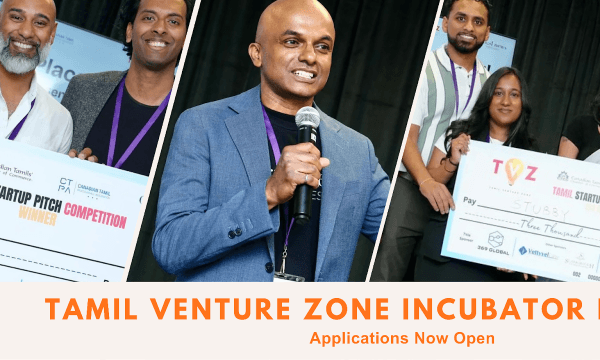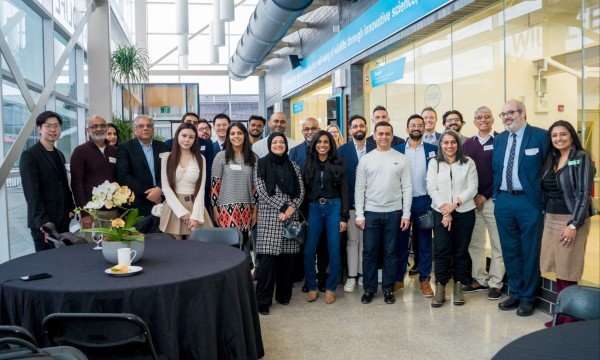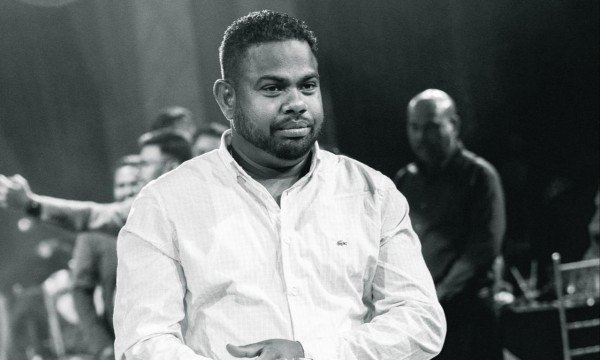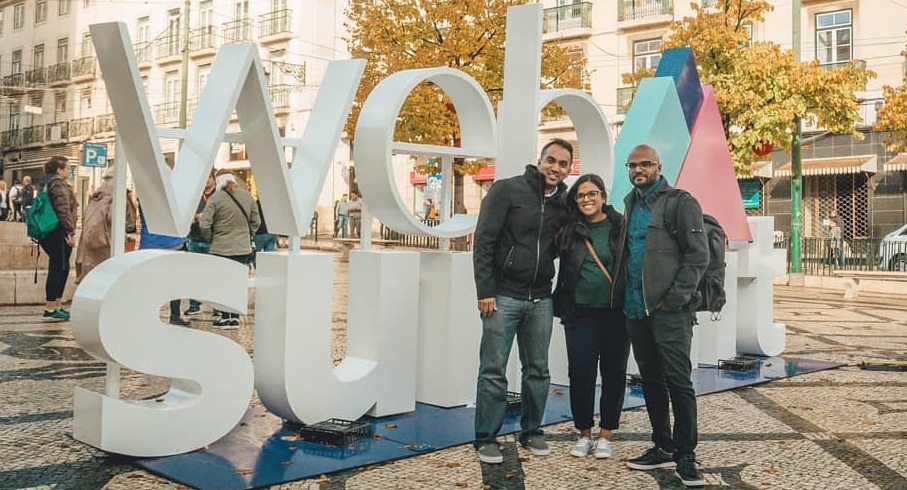
Working hand-in-hand with farmers, The Dunya Project and the Dunya Habitats that are manufactured aim to provide measurable and sustainable solutions to mitigate and adapt to conditions where climate change and water scarcity are affecting crop productivity and food security. I had a chance to speak to the team about their journey.
***Are you or someone you know in the global Tamil community doing great things? We'd love to feature them: FILL OUT THIS FORM ***
I love the mission and story behind Dunya Habitats. Tell us about how long it took to go from idea to working prototype in the field. What were some challenges that were faced along the way?
Dunya defines possibilities. What can be done regardless of the challenges stacked up against you. A transformational change to help put the power of production into the hands of those that need it the most. Our parents were dreamers, especially our father. Normally, parents keep their children grounded to protect them from ever failing… fearing the emotional burden failure can place on a child.
But our parents were the opposite. They always made us shoot for the moon. Sadly, having to leave the land of their birth due to civil inequalities that did not allow them to reach their dreams – drove their desire to provide us with opportunities to grow. Our amma is no longer with us but having come from humble beginnings – coupled with our appa’s social activism – they inspired us to dream of a world where hunger and starvation are no more.
Dunya Habitat's tinyFARM® (PCT Patent pending) is a scalable modular commercial-grade hydroponic system with precision farming software for remote monitoring and data collection to optimize growth. tinyFARM® can grow a variety of fruits and vegetables year-round, in 4-week cycles and with minimal water, land, and no pesticides. Enabled by the future of farming technology – Ammah®, Dunya’s AI driven IoT-based precision farming sensor interface platform to remotely monitor growth, provide data collection and optimize overall crop yield.
The idea originated a few years back, during a pitch competition that Sugeevan participated in at OCAD University along with 500 other schools worldwide. The competition put on by the Hult Prize and the Clinton Foundation looking at ways to ‘restore human dignity and rights to millions of displaced people by 2022.’ Sugeevan and his teammates made it to the regionals in Boston for North America, coming in second to a team from Harvard in their round. It just so happened that at the same time - our appa was also working on a greenhouse project in the Jaffna peninsula in Sri Lanka – to help teach new sustainable ways to farm when dealing with droughts and pests. Combining the essence of the two – Dunya was born.
Currently, the team has a commercial prototype that is being tested and fine-tuned with a local farmer in Kingston, Ontario. Getting to this stage, working amidst a global pandemic has not been easy. The first year was spent on building the proof-of-concept with our basic precision farming sensor interface integration and validating with various markets. Having self-funded, bootstrapped and being able to count on a small pre-seed investment from our advisors have greatly helped the team get to this stage.
Tell us about some wins as well that you’ve had so far that you’re proud of.
The Dunya team has been fortunate to receive recognition here at home in Canada and abroad. Most recently, we won a pitch competition and were chosen as the ‘People’s Choice’ Award at the Ontario Environment Industry Association (ONEIA)’s Quick Pitch event. We were 1 of 15 finalists for Cisco’s Global Problem Solver Challenge in 2019 amongst thousands who applied globally – invited and exhibited at Web Summit and Collision Tech.
Most importantly, even though we are pre-launch – we’ve had sales tractions domestically, and LOIs for units in Europe and Africa. Equally, we have started outreach and received interests from the big players in food security initiatives such as the UN’s Food and Agricultural Organization (FAO), UNHCR and the World Food Programme (WFP).
Has there been anything unexpected that you’ve encountered so far on your journey to change the way food is grown globally?
The global pandemic has certainly brought food production to the front of the table. The total effects of COVID-19 as it ripples through our food systems remains to be seen. However, recent events coupled with systems that have been declining over the years and challenging our food systems, threatening livelihoods and food security. The crisis has certainly opened the world's eyes to just how fragile our current food systems are. It has drawn attention to the need for communities and cities to not only produce food locally but put food security front and centre.
Tell us the story of how the team came together.
Our founding team is made up of siblings (Sugeevan and Sumi Shanmuganathan) and Dr. Shivajan Sivapalan. We came together to support Sugeevan’s founding vision to help minimize food scarcity issues in Indigenous and refugee communities.
Since it’s inception, the team has grown – made up of passionate and agile individuals who not only come from refugee smallholder farming families but have years of experience working on social impact projects, design engineering, robotics, 3D sensors, data analytics, hardware and software development, and government. Leveraging the team’s vast networks and experiences in implementing projects at scale in various jurisdictions – we are supported by seasoned advisors and experts from the agricultural, tech, international development, financial and business sectors.
Do you have a specific case study of how Dunya Habitats has made a specific impact on a village or region? Are you focusing on select regions right now?
Dunya is an early-stage startup in the pre-launch phase. However, over the last two years we have been working with both domestic and global organizations that are supporting projects to help alleviate food insecurity and provide livelihood options for smallholder farmers. Though, the projects are still in the planning phase – we signed an MOU last year with the Botswana Association of Local Authorities to support the training women and youth in utilizing hydroponic farming to mitigate against climate change, and increase domestic crop production. Most recently, we are working with two separate NGOs in Ontario to support their food security initiatives.
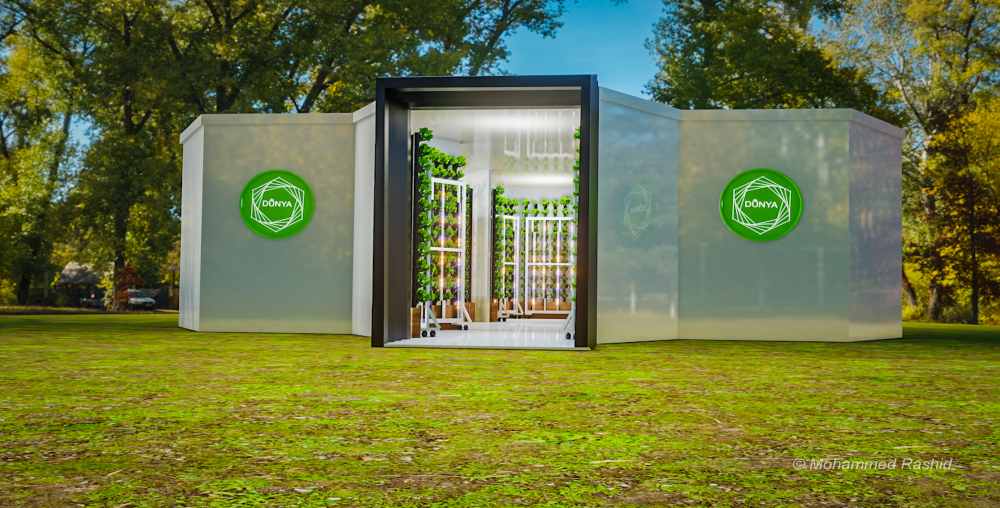
Was Dunya Habitats bootstrapped or did you fundraise? How did you make this decision (regardless of which path you chose)?
Initially we self-funded and have been bootstrapping for the most part. Being that Dunya is an agritech startup with a hardware-enabled-SaaS model driven by a social impact vision – we knew it would not be easily funded. It is not as sexy as a simple SaaS platform for typical investors. However, we were fortunate to have a few advisors that really believed in our team and our vision – they provided a pre-seed investment that has been immensely helpful in getting us toward a commercial prototype.
As investors are becoming more acquainted with social impact investing and the opportunities within agritech, we have received some interests from a number of VCs. Currently, our team is raising a bridge round to help support the launch and get ready for seed round.
How are you monetizing or planning to monetize if you haven’t already?
Dunya’s business model is a hardware-enabled SaaS business model. We have a number of recurring revenue streams built into the business as we continue to scale the business. Even though we are pre-launch, we have received traction through word-of-mouth and generated sales with early adopters as we move forward to fully launching.
How did you go about building your advisory board?
Dunya has been fortunate to have an enthusiastic advisory board. Leveraging our individual networks and building on relationships made at conferences – Dunya is supported by senior advisors with experiences in precision farming, food security, sales and financials.
Do you have any advice for other Tamils (men and women) who aspire to be in a position that you are in today?
Entrepreneurial journey is not a straight shot to success – know that there will be ‘ups and downs’ – be prepared to work for it. Do not get dissuaded by the naysayers, and make sure you surround yourself with a supportive network that is not only made up of ‘yes’ people but those that will challenge you.
Tell us about the support (if any) that you’ve received from the Tamil community.
We have been blessed to be able to call on the Tamil community to connect us with potential collaborators and advisors from Botswana to Silicon Valley. One of our advisors and investors is also a fellow Tamil – and we’ve received encouragement from many in the community.
If you were given $1 billion, how would you allocate the money to change the world?
Dunya is the first step to fulfill our parents’ dreams. When it was first started – Sugeevan would tell everyone that – we’ll have ‘arugula on Mars’ one day. Although the literal meaning of the phrase speaks for itself, the phrase means more.
As refugees – the belief that with hard work and effort, even something that may sound impossible to accomplish in a lifetime, is still something to aim for.
Dunya is not just about growing food, but of providing livelihood options for communities. With $1 billion – we would work towards making our units accessible to 1 million smallholder farmers worldwide – thus ensuring more access to locally grown, fresh and nutritious vegetables and fruits.
We know that by strengthening local food systems and putting the power of increased crop production into the hands of smallholder farmers – we can help alleviate food security
Our parents wanted us to shoot for the moon. Our parents’ dream – our team’s passion – the world’s future, that’s Dunya for us.
***Looking to create your love story? Join the other couples who have dated and got married through myTamilDate.com!***
"How France Met Canada: A MyTamilDate.com Love Story"
"How a Message on myTamilDate.com Led to an Engagement for Lavanya & Vitharan"
Related Articles:
- "How A Daily Ritual and Family Heritage Inspired a Multi-Million Dollar Company: Meet Sashee Chandran, Founder of Tea Drops"
- "Danny Sriskandarajah's Journey From Rural Sri Lanka to CEO of Oxfam Great Britain"
- "Meet Tamil-Canadian Tech Entrepreneur Mano Kulasingam"
- "The NBA Bubble: Dr. Priya Sampathkumar Helped Make It Happen"
- "These Tamil Founders Behind Agritech Startup Dunya Habitats Want To Alleviate Food Security Globally"
- "Marketing Maven Jackson Jeyanayagam Shares Insights From His Illustrious 20-Year Career"
- "Angel Investor Jay Vasantharajah On Building His Portfolio One Day At A Time"
- "Meet Tamil-Canadian Journalist Kumutha Ramanathan"
- "Breaking Into Hollywood: Meet Tamil-Canadian Actor Vas Saranga"
- "Meet Rebecca Dharmapalan - Filmmaker, Legal Scholar, And Activist"







